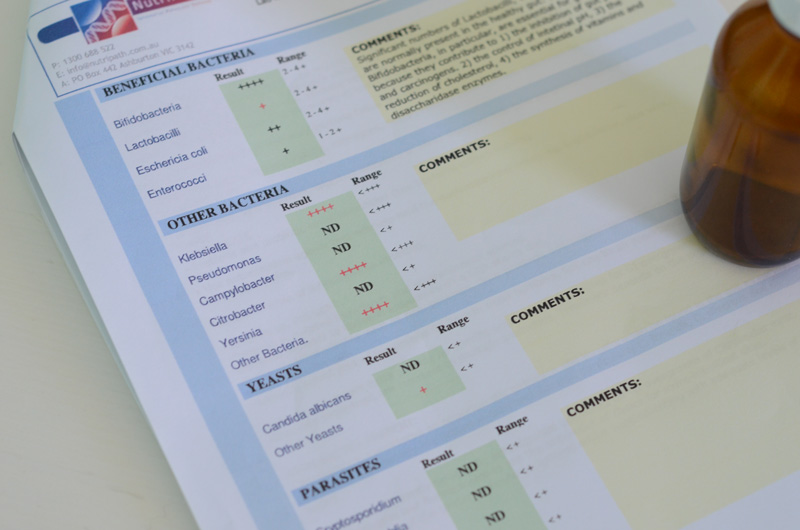Have you been experiencing long term digestive issues with symptoms such as bloating, stomach cramping and alternating diarrhoea/constipation that doesn’t ever seem to go away?
If you’ve been on and off different diets without much change and you are looking for a deeper reason to why your digestive system is feeling off, then a comprehensive stool analysis may help you get the answers you are looking for.
What Can This Test Tell Me?
A Comprehensive Digestive Stool Analysis (CDSA) provides a detailed overview of the health of your digestive system from a functional point of view as well as the microbial communities. It will provide the following information.
Digestion
How you are digesting protein such as meat, starches, fat and vegetable fibres. This will tell me if you are having issues with pancreatic enzyme or stomach acid production which are essential for helping you digest food, reducing symptoms like bloating, stomach cramping and diarrhoea.
Candida or Yeast Overgrowth
Certain candida and yeast species when over populated can produce symptoms such as bloating, gassiness, and diarrhoea. A yeast species called Geotrichum species is associated with symptoms of irritable bowel syndrome (IBS). Yeast and candida can also be associated with skin conditions such as seborrheic and perioral dermatitis.
Pathogenic Bacterial Overgrowth
Certain bacterial populations such as Citrobacter species and Klebsiella pneumoniae are considered opportunistic pathogens, thriving on a high carbohydrate diet such as potato, rice, flour products and sugary foods. Other bacterial species such as the bacillus species are commonly found in meat dishes which can lead to a number of unpleasant digestive symptoms such as increased stool frequency and loose bowel motions.
Good Bacteria
This test will give us a snap shot of the quantity of these species that are found with in your digestive system. This will include Bifidobacterium, Lactobacillus, Bifidobacterium and E.coli and Enterococci. Having low levels of certain good bacterial species can increase risk for IBS, inflammation in the digestive system, constipation and mood disorders.
Parasitic infection
This CDSA test will look microscopically to see if there are any parasites present such as Dientamoeba fragilis or Blastocystis hominis. If I am suspcious of a parasitic infection, an additional parasite screening may be added for improved detection.
When Would You Recommend a CDSA?
A Comprehensive Stool Analysis (CDSA) may be recommended if you are experiencing any of the following symptoms:
- Bloating
- Wind
- Diarrhoea
- Constipation
- Irritable Bowel Syndrome
- Stomach pain or nausea
- Chronic skin conditions such as rosacea, eczema, keratosis pilaris, seborrheic dermatitis and psoriasis
What Does This Test Involve?
1. You will be provided with a stool test kit in your initial consultation.
2. You will be asked to cease any probiotics, digestive enzymes and laxatives three days prior to collecting your stool sample.
3. You will also need to collect your stool sample 2 weeks after antibiotics or anti-fungals so that you can receive a more accurate representation of your digestive health.
4. Collection of your stool will be in the comfort of your own home between Monday and Wednesday. Once collected you will then post it in the express post bag provided.
5. Your test result will be received between 10 – 14 business days. I will then provide a photo copy of your test results as well as thoroughly explain what the results indicate and the most appropriate treatment plan for you. This treatment plan may involve herbal or nutritional medicine recommendations as well as a specific dietary plan for your digestive health.


